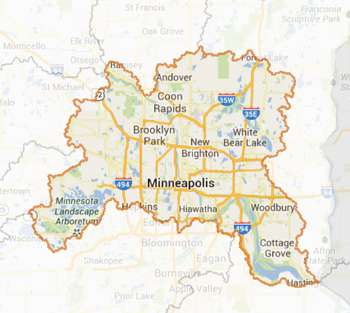MPCA water quality report for Mississippi River-Twin Cities

The metro-area Mississippi River Watershed.
Photo: Minnesota Pollution Control Agency
The Minnesota Pollution Control Agency recently released a summary of water quality conditions in rivers, lakes, and streams throughout the Twin Cities metro area Mississippi River watershed. The report is the result of an intensive assessment process that began in 2010. According to the MPCA, sampling included 180 lakes and 46 stream segments to see if they are supporting aquatic life, recreation, and fish consumption.
The data in the report is a stark reminder of the need for vastly improved water quality stewardship and protection throughout the metro Mississippi River. The study found higher levels of nutrients like phosphorous that can sometimes cause toxic algae blooms in lakes. Elevated levels of bacteria also make streams potentially unsafe. Increases in impervious surfaces like roads, rooftops and parking lots alter natural hydrology making streams flashier and more prone to erosion. Overall, about 70% of impaired waters (water bodies that fail to meet state standards for at least one particular pollutant) in this watershed are nutrient-impaired lakes where excessive levels of phosphorous and or nitrogen threaten aquatic life and recreation.
Specific findings included:
- The 84 lakes assessed support aquatic recreation like swimming and boating based on water clarity and levels of algae present, while 87 assessed do not.
- Eight previously impaired lakes have been restored and are considered healthy.
- Fifty-one lakes were found to have fish with high levels of mercury, PCBs (polychlorinated biphenyls) and/or PFOS (perfluorooctane sulfonate). Because of this, fish consumption advisories are recommended for lakes across the watershed.
- Based on monitoring the amounts and types of fish and bugs found in streams, two streams assessed support aquatic life, while 21 assessed do not.
- Due to high levels of bacteria, only one stream assessed supports aquatic recreation, while 17 assessed do not.
How you can help
The MPCA recommends a variety of personal actions that can help address many of the issues in this study. Picking up pet waste, reducing the use of deicers, using rain gardens or rain barrels, minimizing application of lawn fertilizers, cleaning up grass clippings and leaves, and making sure septic systems are up-to-date are vital tools in restoring the watershed.
For more information on how you can help, review the State of the River Report Stewardship Guide for our top-10 tips on how you can help protect and restore the Twin Cities metro Mississippi River and its watershed.
For more information
For more information, visit the MPCAs project page here. A summary fact sheet on the study is available here. And, as always, feel free to visit the State of the River Report to review the history, status, and trends of key indicators of water quality and river health in the Metro Mississippi River.